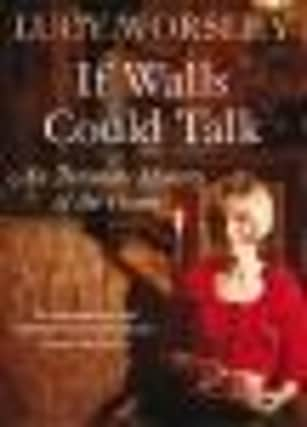Book review: If Walls Could Talk by Lucy Worsley


This is just one of the many fascinating facts unearthed by Lucy Worsley as she trawls, hand over nose, through a truly intimate history of the home that is as foul and rank as it is informed, funny and saucily entertaining.
If Walls Could Talk, a beautifully illustrated book, examines how people really lived, loved and died over the centuries and accompanies the author’s major TV series which is currently wowing viewers on BBC4.
Advertisement
Hide AdAdvertisement
Hide AdNo corner of the country’s bedrooms, bathrooms, kitchens and living rooms is left untouched in this eye-popping account of how each room has evolved from medieval times to the present day.
Worsley is fast becoming one of our best-loved popular historians and this extraordinarily accessible and enjoyable feast of facts provides the perfect balance between gravitas and gossip.
By focusing on what people actually did in bed, in the bath, at the table and at the stove, from breast-feeding and teeth-cleaning to getting dressed and getting married, we see our homes through new eyes.
And just as the home is a microcosm of the nation as a whole, the book encompasses broader themes like female emancipation, domestic service, technological progress and social and sexual issues.
Advertisement
Hide AdAdvertisement
Hide AdLife without hot water would be unimaginably awful for many of us today, but for centuries it was a luxury beyond reach or even thought.
But we haven’t always been a nation of unwashed – medieval folk enjoyed communal bathing in much the same style as their earlier Roman conquerors – but by the 16th century, bath houses had become synonymous with brothels.
So began the two ‘dirty’ centuries from around 1550 to 1750 when washing was considered to be weird, sexually arousing or downright dangerous.
This could account for the ‘evil smells’ and ‘displeasant airs’ clinging to Anne of Cleves and which made Henry VIII unable to consummate their marriage.
Advertisement
Hide AdAdvertisement
Hide AdAnd Georgian high society balls were noted for the smell of ‘mingled odours, arising from putrid gums, imposthumated lungs, sour flatulence, rank armpits, sweating feet and running sores’.
It was only when 17th century doctors started ordering medicinal baths that regular bathing started inching its way back into fashion.
For many over the centuries, just getting through infancy and into adulthood was an achievement in itself.
Worsley’s peep into the bedrooms of history reveals the terrifying risks of giving birth. The medieval death rate was one in every 50 births and even by Tudor times, many pregnant women had their portraits painted for the poignant reason that it might be a final farewell to their husbands.
Advertisement
Hide AdAdvertisement
Hide AdSealed in a darkened and airless birthing chamber, the Tudor and Stuart woman was not allowed to wash, have her straw mattress changed or even sit up for two weeks after giving birth.
The kitchen, however, was and remains the heart of the home. In a medieval peasant’s cottage, the kitchen was the only room of the house, serving as the bedroom and living room as well.
In grander homes, the kitchen was often placed in a separate block from the main house to keep cooking smells and the risk of fire at bay.
When open fires were replaced by enclosed kitchen ranges in homes large and small, the problem of cooking odours became a real problem with even Queen Victoria complaining about the constant ‘smell of dinner’.
Advertisement
Hide AdAdvertisement
Hide AdIf Only Walls Could Talk is a treasure trove of wit, wisdom and weird and wonderful facts...to miss it would be to miss out on a large slice of bizarre British history at its brilliant best.
(Faber, hardback, £20)